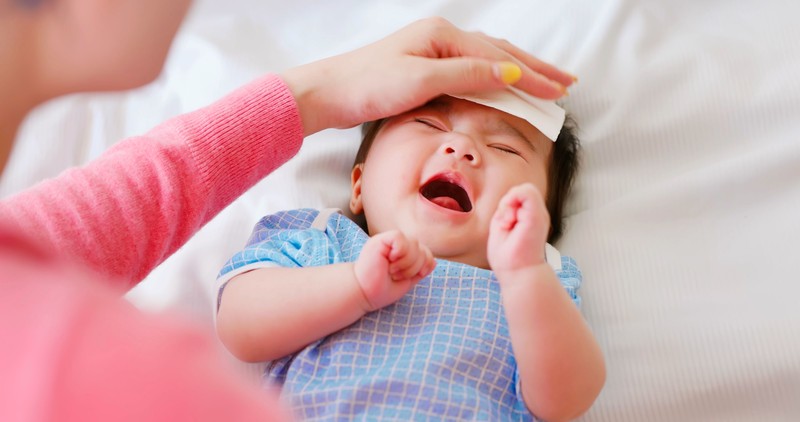
Fever in Babies: Special Considerations for Infant Care
Seeing your baby with a fever can be a stressful experience for any parent. A fever is the body’s natural response to an infection or illness, but when it comes to babies, there are special considerations that need to be taken into account.
In this article, we’ll explore the topic of children fever, focusing on infants, and provide valuable information to help parents understand how to care for their little ones during this challenging time.
Understanding Fever in Babies
A fever is defined as a body temperature higher than the normal range. In adults, this is typically considered to be 98.6°F (37°C), but in infants, a rectal temperature of 100.4°F (38°C) or higher is generally regarded as a fever.
Fever in babies can be caused by various factors, such as infections, teething, vaccinations, or environmental conditions. While a fever itself is not an illness, it is often a sign that the body is fighting an infection. Common causes of fever in infants include colds, flu, ear infections, urinary tract infections, and respiratory infections.
Special Considerations for Infant Care
Infants, especially those under three months of age, require extra care when they have a fever. Their immune systems are not fully developed, and they may not be able to regulate their body temperature as effectively as older children or adults. Here are some important considerations for infant fever care:
Consult a Pediatrician
If your baby has a fever, it’s crucial to consult a pediatrician. In infants under three months, even a low-grade fever can be a cause for concern. Your pediatrician can evaluate your baby’s condition and determine the underlying cause of the fever.
Monitor the Temperature
It’s important to monitor your baby’s temperature accurately. While there are various types of thermometers available, a rectal thermometer is considered the most accurate for infants. Follow the manufacturer’s instructions for safe and correct use. Avoid using ear thermometers in babies under six months.
Dress Your Baby Comfortably
Dress your baby in light and breathable clothing to help regulate their body temperature. Avoid heavy layers or overdressing, as this can make your baby feel uncomfortable. Keep the room at a comfortable temperature, not too hot or too cold.
Hydration is Key
Fever can lead to increased fluid loss through sweating. It’s important to ensure your baby stays well-hydrated. If you are breastfeeding, continue to do so on demand. If you are bottle-feeding, offer your baby small amounts of formula or breast milk more frequently. In some cases, your pediatrician may recommend an oral rehydration solution.
Fever-Reducing Medications
Your pediatrician may recommend fever-reducing medications such as acetaminophen or ibuprofen, but only use these under the guidance of a healthcare professional. It’s essential to follow the recommended dosage and administration instructions carefully, as the dosages for infants are based on their weight. Never give aspirin to a child under the age of 18, as it can lead to a rare but severe condition called Reye’s syndrome.
Fever Red Flags
While most fevers in infants are caused by minor illnesses and resolve on their own, there are situations that require immediate medical attention. If your baby exhibits any of the following signs, seek emergency care:
- A rectal temperature of 100.4°F (38°C) or higher in infants under three months.
- A persistent high fever in an infant or toddler, even with the use of fever-reducing medications.
- Lethargy or difficulty waking up.
- Difficulty breathing or rapid breathing.
- A persistent high-pitched or inconsolable cry.
- Seizures.
Trust Your Parental Instincts
As a parent, you know your baby best. If you have concerns about your baby’s condition, don’t hesitate to contact your pediatrician. Trusting your instincts and seeking professional guidance when needed is essential in caring for your baby.
Preventing Fever in Babies
Preventing fever in babies can be challenging, as many fevers are caused by common infections. However, there are steps you can take to reduce the risk:
- Ensure your baby receives recommended vaccinations on schedule.
- Practice good hygiene by washing your hands and your baby’s hands frequently.
- Avoid exposing your baby to individuals who are sick.
- Keep your baby’s environment clean and free from potential hazards.
Conclusion
Fever in babies can be a cause for concern, but with the right care and attention, most fevers can be managed effectively. It’s essential to consult your pediatrician if your baby has a fever, especially if they are under three months old.
By monitoring your baby’s temperature, keeping them comfortable, and providing proper hydration, you can help your little one recover and return to their cheerful self.
Remember that as a parent, you are your baby’s best advocate, and trusting your parental instincts is an integral part of providing the care and support your child needs during times of illness.
